|
|
|
Sort Order |
|
|
|
Items / Page
|
|
|
|
|
|
|
| Srl | Item |
| 1 |
ID:
105962
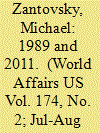

|
|
|
| 2 |
ID:
130238
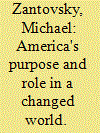

|
|
|
|
|
| Publication |
2014.
|
| Summary/Abstract |
It is not a new observation that, just as the twentieth century started late, with the shots in Sarajevo, so did the twenty-first century, with the September 11th attacks. Compared to the conflagration that followed the first event, whose centennial this year is a welcome opportunity for some belated soul-searching, the bloodshed that started with the second event has been limited, but its consequences may have been just as profound. The two American administrations that inherited the post-September 11th world have since struggled, along with the rest of the world, with the consequences. One chose to confront the evil head-on, in order to eradicate its sources and deter its repetition, with mixed results. The other largely opted for seeing and hearing little evil, with results that the jury is still out considering.
|
|
|
|
|
|
|
|
|
|
|
|
|
|
|
|
| 3 |
ID:
134844
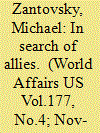

|
|
|
|
|
| Summary/Abstract |
During the Czech Republic’s first year of existence, most Czechs felt that nothing much had happened. True, there was now a new country east of the Morava River, where they had previously gone to hike and ski without the need of a passport. But nothing had changed within the Czech lands, Bohemia, Moravia, and a stump of Silesia. They were still there, as they had been for a thousand years, a country of milk and honey, hardworking, peaceful people, known around the world for their skills, intelligence, and culture.
|
|
|
|
|
|
|
|
|
|
|
|
|
|
|
|
| 4 |
ID:
095422
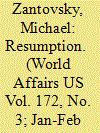

|
|
|
|
|
| Publication |
2010.
|
| Summary/Abstract |
One day in October 1989, in a Prague fish restaurant long since privatized, Vaclav Havel sat down to be interviewed by a British journalist. Asked about the ongoing events in the Communist bloc, he voiced-with my modest help as his translator-his pleasure at the direction things were taking in the round-table Poland, reformist Hungary, and even the once impregnable East Germany. The evidence of the crumbling of the system was everywhere around us, in the shape of hundreds of Trabant cars deserted unsentimentally on the streets of Prague, by East Germans voting with their feet for a future in the West. Yet, asked when the moment of truth might arrive in Czechoslovakia, Havel, in his-for a playwright-atypically undramatic manner, would not be drawn out. "I am not sure," he said. "It might take a month, maybe a year, perhaps a long time. We might not live to see the day. One simply cannot tell." Several weeks later the day arrived. Very few people had been able to predict it with any more precision than Havel.
|
|
|
|
|
|
|
|
|
|
|
|
|
|
|
|
| 5 |
ID:
108682
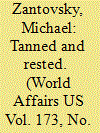

|
|
|
| 6 |
ID:
130250
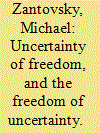

|
|
|
|
|
| Publication |
2014.
|
| Summary/Abstract |
It likely has occurred to everyone at least once that it would be a wonderful thing to win the lottery. And many of us have indeed bought a lottery ticket at least once in our lives, only to validate the well-known fact that the chances of winning in a lottery are rather small. Some of us, though, may have not put up with this sober conclusion and proceeded on the assumption that if we bought two tickets our chances of winning the lottery would increase twofold, and then perhaps extrapolated the logic to three, five, or even ten tickets. And a few of us might have even entertained the theoretical possibility that if we bought all the tickets we would be assured of winning the lottery. There is nothing wrong with dreaming of a stroke of luck and trying to maximize one's chances. But it also pays to use common sense and elementary knowledge of the probability calculus. Buying all the lottery tickets will not only give you an absolute certainty of winning but also an absolute certainty of losing vast amounts of money in the process.
But what, one may ask, does buying a lottery ticket have to do with freedom? Freedom, after all, is arguably not an outcome of a random process like winning in a lottery. It is a conscious choice to believe that men are born with certain inalienable rights and should be thus free to make decisions about their lives. Based on this belief, we build the institutions of a free society, provide them with the necessary checks and balances, and guarantee the rule of law to prevent arbitrary punishment and thwart attempts to hijack our freedom. For all the problems of a free society, we believe with Winston Churchill that democracy, the political system that embodies, maintains, and administers a free society, is vastly preferable to all the alternatives. Living in a democracy, we believe that we have hit the jackpot in the lottery of political systems.
|
|
|
|
|
|
|
|
|
|
|
|
|
|
|
|
| 7 |
ID:
115061
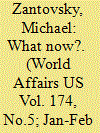

|
|
|
|
|
| Publication |
2012.
|
| Summary/Abstract |
The train wreck of the Palestinian request for recognition as a state at last year's meeting of the United Nations, which could have been seen coming for at least the whole of last summer, laid bare the total vacuity of the term "Middle East Peace Process" and the impotence of the international diplomacy surrounding it. Such a disaster often occurs when process takes over substance and justifies its own existence by belated and ultimately unsuccessful attempts at remedy. Some of it is a matter of physics-when the train sets out it is relatively easy to stop with a timely application of the brakes. When, on the other hand, it is allowed to gain full speed because of arguments among the engineers, idle hopes that the train will run out of steam, or the simple refusal to acknowledge that it is even moving, the only thing left to do is to lie down on the floor and pray.
|
|
|
|
|
|
|
|
|
|
|
|
|
|
|
|
|
|
|
|
|